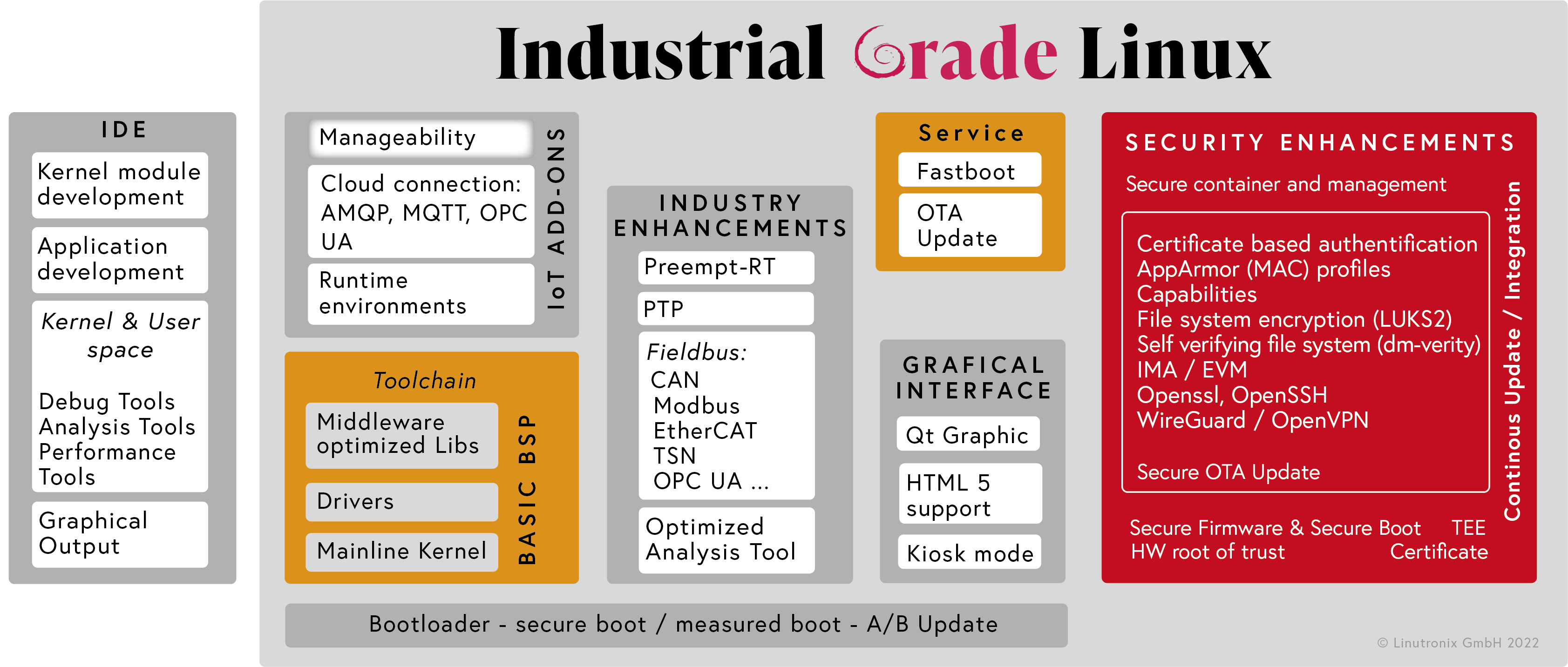Industrial Linux
Now it's real(ly)time

Industrial Linux
Now it's real(ly)time


At the beginning of its career, Linux was found mainly in the IT world, but for several years now it has made increasing progress into the industrial sector (embedded computers).
The realtime capability of the kernel has certainly contributed to this. Realtime here stands for deterministics. We here at Linutronix have played a major role in this and are still doing so as part of the Linux Foundation's Realtime Linux /RTL project.
More about this at wiki.linuxfoundation.org.
With the triumph of networking (keyword: IoT, Industry 4.0), its use is becoming more and more self-evident, especially here. Only with the help of open systems, all the demands on embedded systems such as edge computing, artificial intelligence, deep learning and so on can be met in the future.
Linux is an ambiguous term. It originally referred to an operating system kernel. The further development of this kernel is accomplished by Linus Torvald and all the other members of the community and is available for download in source code via kernel.org. On the other hand, the term also stands for all operating systems that use this kernel, such as Android, FritzOS or Ubuntu. Whereby in the case of Ubuntu, Debian, RHEL or also FritzOS we should rather use the term "distribution". In addition, there are all the suppliers of chips or modules/computers that produce their own versions of Linux. What they have in common in most cases is, they do not use an "official" kernel, i.e. one provided by kernel.org.
|
You already know Linux from your server or desktop PC? Then you also know what a Linux distribution actually is: It is all the software that you get together with the Linux kernel for your system. |
We support you from the first considerations towards Linux via the use of the Chip Vendor BSP and then further via a customized BSP using Yocto or Debian up to the life cycle management of "your" BSP.

Yocto is a tool to create your own distribution. And Debian is a widely used distribution, which is also used as a basis for many other distributions. But - Debian itself is not a tool to create a distribution.
|
With a requirements workshop, you will learn about relevant topics such as license requirements, git source code management, security, update, containers or hypervisor solutions, boot time, encryption, etc. even before your first Linux project. Based on this, "your" solution can be defined together. |
Linutronix helps you to immediately use the provided BSP for your development by adapting it to your specific needs. This way you avoid dependency on the availability of your own hardware. As soon as it is available, we perform the hardware bring-up and port bootloader, kernel and drivers from the mainline code for the chosen processor. Whether you want your BSP to be built using Yocto or based on the proven Debian distribution is up to you.
When creating your BSP, we already optimize it for your requirements (footprint, real-time capability, integration of special libraries) and, if desired, harden the Linux system (Security) according to your requirements (including regulatory requirements) and integrate the necessary update capability (Update).
Using Yocto or the build system ELBE (Elbe) with Debian guarantees the reproducibility of the created BSP, the easy adaptability to variants of your product and its maintenance over a long time (IGL life cycle management, subscription).
Our team of highly motivated and qualified employees supports you in all questions around embedded Linux. Starting with the bootloader up to the libraries and tools you need for your application, you get everything from one source! We take care of the operating system and everything that goes with it. You can fully concentrate on your own know-how!
We do not only provide complete solutions. We also give support with individual sub-aspects of your project!
We do provide complete solutions. But We also give support with individual sub-aspects of your project!